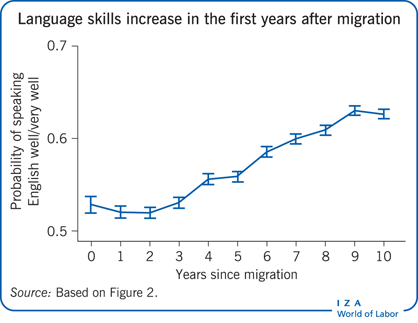Elevator pitch
Language proficiency is a key driver of immigrant integration. It increases job opportunities and facilitates social and political participation. However, despite its vital importance, many immigrants never reach adequate proficiency in the host country language. Therefore, insights into the underlying processes and associated factors are crucial for designing measures to improve language acquisition. Empirical evidence shows that immigrants differ in their ability to learn languages, in their experience of everyday language usage, and their incentives to learn host country languages. This offers a range of opportunities for public policy intervention.

Key findings
Pros
Immigrants arriving during childhood effortlessly acquire the primary language of the host country.
Language skills increase with time spent in the destination country through exposure and learning by doing.
Higher wage returns and better job opportunities create incentives to invest in the acquisition of languages.
Point-based immigration selection rules, language classes, and citizenship incentives are policy options that can be used to encourage language acquisition.
Cons
Greater linguistic distance between the native language and the host country language increases the difficulty and cost of language acquisition.
Living in ethno-linguistic enclaves reduces exposure to the host country language and thus opportunities to use it regularly.
Circular migration and short expected durations of stay decrease incentives for language acquisition.
The efficiency of language acquisition is also influenced by characteristics that are not observed in the data and can only be approximated, such as motivation and cognitive abilities.